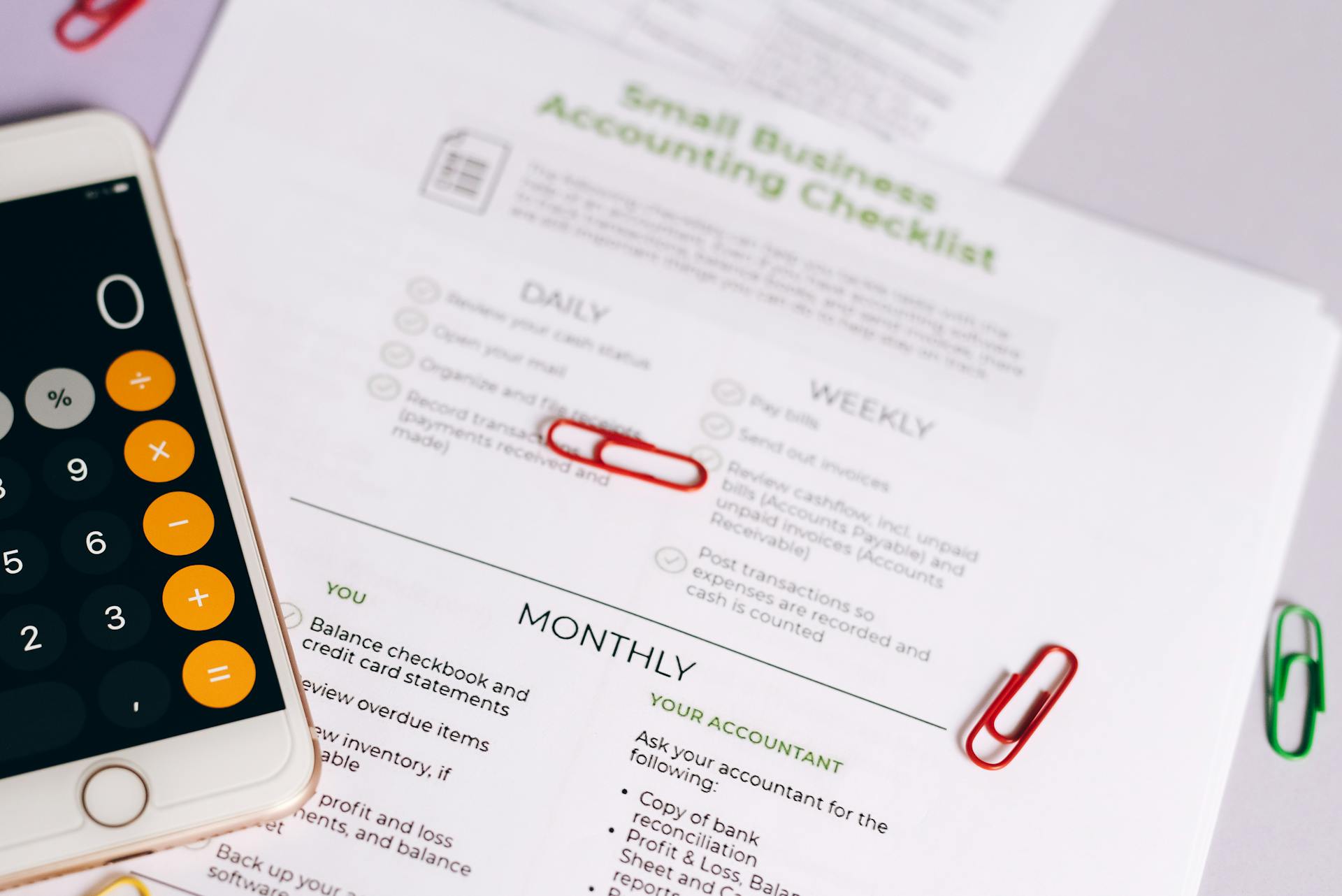
To become an accounting manager, you typically need a bachelor's degree in accounting or a related field, such as finance or business administration.
A strong educational foundation is essential for success in this role, as it provides a solid understanding of financial principles, laws, and regulations.
Accounting managers often start their careers as accountants and work their way up, gaining experience and developing their skills over time.
The median annual salary for accounting managers in the United States is around $134,000, according to the Bureau of Labor Statistics.
With experience and additional education, accounting managers can move into senior leadership roles or start their own accounting firms.
Explore further: What Do Money Managers Do
Education and Qualifications
To become an accounting manager, you'll need to meet certain education and qualification requirements. A bachelor's degree in accounting, finance, or a related field is the minimum requirement, taking around 4 years to complete. This degree program covers fundamental accounting theory and practice, preparing you for various roles in the field.

In some cases, employers prefer or require accounting managers with master's degrees, which can take 1-2 years to complete. These graduate programs provide a foundation in advanced accounting topics, such as accounting ethics, cost accounting, auditing, and fraud examination.
To stand out in a competitive job market, having an undergraduate degree alone isn't enough. You should also consider additional education, like an MBA or a professional certificate like the CMA.
Here are some key qualifications to keep in mind:
- Bachelor's degree in accounting, finance, or a related field
- Master's degree in accounting (in some cases)
- Professional certifications like the CMA
- Relevant work experience (at least 5 years in some cases)
- Skills like communication, leadership, problem-solving, and financial analysis
Keep in mind that some employers may accept education as a substitute for experience or vice versa. Additionally, many colleges offer accounting internships and practicums to help students acquire both education and experience.
Job Requirements
To become an accounting manager, you'll need a solid foundation in education and experience. You'll typically need at least a bachelor's degree in accounting or a related field, which takes four years to complete.
Accounting managers require relevant, specialized professional experience, with most positions needing at least five years of experience in the accounting or financial fields. This can be gained through internships, part-time positions, or full-time permanent roles.
To qualify for many positions, accounting managers need to possess important skills such as communication, leadership, problem-solving, and financial analysis.
A different take: Money Managers
Experience Requirements

To become an accounting manager, you'll need a solid foundation in accounting and finance. Typically, a bachelor's degree in accounting or a related field is required, which can take four years to complete.
Many accounting managers start their careers in lower-level accounting roles, such as accountants, financial analysts, or auditors. This experience can take around five years to accumulate, but it's essential for qualifying for accounting manager positions.
You'll also need to develop key skills, including communication, leadership, problem-solving, and financial analysis. These skills are crucial for managing a team and making informed financial decisions.
Here are the typical experience requirements for an accounting manager:
Keep in mind that some employers may accept education as a substitute for experience or vice versa. It's essential to stay updated on financial principles and regulatory changes to succeed in the managerial role.
Salary
The salary for an accounting manager can vary widely, with the average salary being around $79,029.
Broaden your view: Financial Reporting Accountant Salary

This figure can be influenced by factors such as skills, experience, and industry of choice.
First-time accounting managers can expect a salary closer to $54,000.
However, with hard work and impressing your team, you could earn as much as $110,000 with more experience.
Pursuing a professional certification can improve your chances of earning more as a manager, with those having a CMA earning up to 58% more than non-certified professionals.
Career Advancement
Accounting managers can advance their careers to even higher-level jobs with more experience. A master's degree in accounting and professional certification can help them stand out from the competition.
With a strong track record of experience, accounting managers can aim for roles like chief financial officer (CFO) or corporate controller. Both of these positions require greater responsibility than typical accounting manager jobs.
Accounting managers can make some of the best salaries in the field, with a median annual salary of $77,250 as of May 2021. However, their employment can be vulnerable to economic downturns.
To become an accounting manager, you'll typically need a minimum of a bachelor's degree in accounting or a related field and multiple years of relevant experience. This can take around 4-6 years in school and 2-5 years building experience in an accounting career.
Suggestion: Investment Management Manager
Job Search and Preparation

To land an accounting manager job, you'll need to have a solid foundation in education and experience. A bachelor's degree in accounting or a related field is the minimum requirement, taking around four years to complete.
Having a degree is just the starting point. You'll also need to gain professional experience, which typically takes around five years. This can be achieved by working as an accountant or auditor.
In preparation for your job search, consider earning an accounting certification to give yourself an edge over other applicants. This can also help you negotiate a higher starting salary.
Job Search Steps
To start your job search as an accounting manager, you'll need to meet the basic requirements. This typically involves earning a bachelor's degree in accounting or a related field, which can take four years of full-time enrollment to complete.
You should also gain relevant work experience, with at least five years in accounting or a related field. This can include internships, part-time positions, or full-time permanent roles. Many employers prefer candidates with a combination of education and experience.

To stand out from other applicants, consider pursuing an accounting credential or a graduate degree. This can give you leverage to ask for a higher starting salary and qualify for higher-level jobs.
Some common job titles for accounting managers include senior cost accountant, corporate accountant, financial manager, management or cost analyst, and director of corporate accounting.
Here are some key skills to highlight in your job search:
- Communication
- Leadership
- Problem-solving
- Financial analysis
These skills can be demonstrated through your experience, education, and certifications. Be sure to tailor your resume and cover letter to showcase your relevant skills and experience.
In terms of job search strategies, it's essential to network and build relationships within the industry. Attend industry events, join professional organizations, and connect with other accounting professionals on LinkedIn. This can help you learn about job opportunities and get referrals.
When applying for accounting manager positions, be prepared to discuss your experience and skills in detail. Highlight your achievements and how they align with the job requirements.
Interview Preparation

Interview Preparation is a crucial step in acing a job interview. Research the company thoroughly to understand their products, services, mission, and values.
Knowing the company's culture and values will help you tailor your responses to the interviewer's questions. This will also give you confidence in speaking about the company.
Prepare answers to common interview questions, such as "Why do you want to work for this company?" or "What are your strengths and weaknesses?" Practice your responses with a friend or family member.
Acing a job interview requires preparation and practice. It's not just about answering questions, but also about asking the right questions to the interviewer.
Prepare a list of questions to ask the interviewer, such as "What are the biggest challenges facing the company?" or "Can you tell me more about the company culture?" This will show your interest in the company and position.
Research the company's competitors and industry trends to demonstrate your knowledge and interest in the field.
Explore further: Accounting Research
Certifications and Skills

As an accounting manager, having the right certifications and skills can make all the difference in your career. A master's degree in accounting is not required, but it can lead to career advancement opportunities.
To become a certified management accountant (CMA), you'll need a bachelor's degree or professional accounting certification and two years of work experience. You'll also need to complete parts I and II of the CMA exam, which requires 300 hours of studying.
Certifications like the Certified Public Accountant (CPA) are also highly valued by employers. In fact, many organizations require a CPA for management positions. Obtaining a CPA can give you the ability to do certain types of accounting work as a certified professional.
In addition to certifications, accounting managers need to develop key skills. Leadership, analytical thinking, and attention to detail are essential for success in this role. Planning and forecasting are also critical skills for accounting managers, as they need to analyze information to strategize and plan for the company's future.

Here are some key skills to focus on as an accounting manager:
- Leadership: accounting managers need to be good leaders who can solve problems, inspire others, and communicate effectively.
- Analytical thinking: accounting managers need to be able to analyze data and numbers to understand the implication of figures on a company's ability to achieve its goals.
- Attention to detail: accounting managers need to catch errors and notice even the most minor details in the work submitted by their team members.
- Planning and forecasting: accounting managers need to be able to analyze information to strategize and plan for the company's future.
By focusing on these certifications and skills, you can set yourself up for success as an accounting manager and take your career to the next level.
Job Description and Titles
As an accounting manager, you'll be leading a team of professionals, which means you'll need to possess strong leadership and management skills. To give you a better idea of what this role entails, let's take a look at some common job titles for accounting managers.
Some common job titles for accounting managers include senior cost accountant, corporate accountant, financial manager, management or cost analyst, and director of corporate accounting.
An accounting manager's responsibilities are diverse and require a well-rounded skill set. They'll be developing and collaborating on plans and policies, projecting and forecasting into a company's future, creating and analyzing financial reports, managing a team of professionals, presenting reports to the C-suite, and working alongside and for the CFO and Controller.
Here are some specific job titles for accounting managers:
- Senior cost accountant
- Corporate accountant
- Financial manager
- Management or cost analyst
- Director of corporate accounting
Career Outlook

As an accounting professional, you're likely wondering if the field is worth investing in. Yes, accounting managers are in demand.
The Bureau of Labor Statistics (BLS) projects stable demand for accountants and auditors from 2020-2030. This means you can expect a steady flow of job opportunities.
Financial managers are expected to experience faster-than-average job growth in the same period, according to the BLS.
Sources
- https://www.accounting.com/careers/accounting-manager/how-to-become/
- https://www.wgu.edu/career-guide/business/accounting-manager-career.html
- https://www.accounting.com/careers/accounting-manager/
- https://cmaexamacademy.com/how-to-become-accounting-manager/
- https://www.linkedin.com/advice/0/how-do-you-become-accounting-manager-skills-corporate-accounting-m3yde
Featured Images: pexels.com


